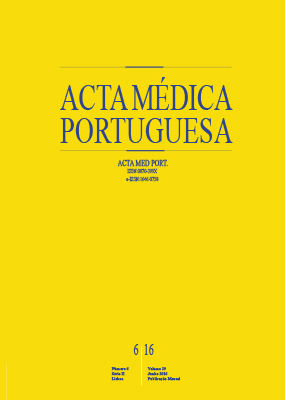Study of the Sociodemographic Factors and Risky Behaviours Associated with the Acquisition of Sexual Transmitted Infections by Foreign Exchange Students in Portugal
DOI:
https://doi.org/10.20344/amp.6992Keywords:
Chlamydia trachomatis, International Educational Exchange, Portugal, Risk-Taking, Sexually Transmitted Diseases, Sexual Behavior, Socioeconomic Factors, Students, Surveys and Questionnaires.Abstract
Background: Sexual transmitted infections are a main cause of morbidity, being a public health problem due to its reproductive complications, mostly observed in teenagers and young adults. The purpose of this study was to evaluate sociodemographic factors and risky behaviours associated with sexual transmitted infections acquisition and to assess personal awareness of risky behaviour and the knowledge about Chlamydia trachomatis infection between foreign exchange students in Portugal.
Material and Methods: The main instrument for data collection was a questionnaire, applied to foreign students in university exchange in Portugal, during the years 2012/2013, 2013/2014 e 2014/2015
Results: Three hundred and thirty eight (338) questionnaires were evaluated, being 58.3% female students, aged between 17 and 30 years old. Mean age for the beginning of the sexual activity was 17.5 years old and the mean number of lifetime sexual partners was 6.9. Concerning the answers given: 11.8% mentioned a sexual relationship with the same gender, 9.5% mentioned that they have never done oral sex and 29% assumed they had practiced anal sex; 82.1% mentioned alcohol/drugs consumption; 21% did not know that Sexual transmitted infections can be transmitted through oral sex and 42.3% did not recognize Chlamydia trachomatis as an Sexual transmitted infections agent.
Discussion: Although sexual transmitted infections can affect individuals of all ages, races and sexual orientation, various demographic, social and behavioral factors have revealed influence in their prevalence rates.
Conclusion: Despite knowing about sexual transmitted infections, these students maintain sexual risky behaviours, mainly early age for starting sexual activity, multiple sexual partners and the absence of protection during sexual activities.
Downloads
Downloads
Published
How to Cite
Issue
Section
License
Copyright (c) 2016 Acta Médica Portuguesa - Ordem dos Médicos

This work is licensed under a Creative Commons Attribution-NonCommercial 4.0 International License.
All the articles published in the AMP are open access and comply with the requirements of funding agencies or academic institutions. The AMP is governed by the terms of the Creative Commons ‘Attribution – Non-Commercial Use - (CC-BY-NC)’ license, regarding the use by third parties.
It is the author’s responsibility to obtain approval for the reproduction of figures, tables, etc. from other publications.
Upon acceptance of an article for publication, the authors will be asked to complete the ICMJE “Copyright Liability and Copyright Sharing Statement “(http://www.actamedicaportuguesa.com/info/AMP-NormasPublicacao.pdf) and the “Declaration of Potential Conflicts of Interest” (http:// www.icmje.org/conflicts-of-interest). An e-mail will be sent to the corresponding author to acknowledge receipt of the manuscript.
After publication, the authors are authorised to make their articles available in repositories of their institutions of origin, as long as they always mention where they were published and according to the Creative Commons license.









